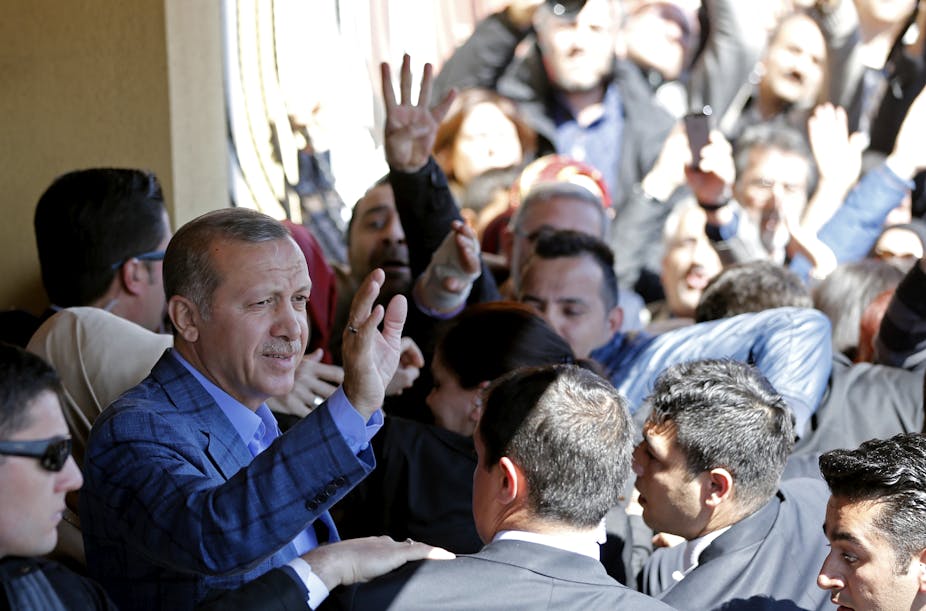The Turkish people went to the polls at the weekend against a backdrop of some of the most serious unrest the country has seen in living memory. The local elections, in which the ruling AKP (Justice and Development Party) achieved an impressive 45% of the vote, is the first of three polls, to be followed in August by the country’s first direct presidential election. A general election will follow next year.
This is a convincing electoral victory for any government that has been in power for nearly 12 years but more so in the case of Turkey where the government has had to deal with serious unrest in the form of mass demonstrations in June that turned into a nationwide protest movement.
More recently, there has been a series of corruption allegations surrounding the inner circle of the prime minister, Recep Tayyip Erdogan, which has embroiled three cabinet members and their sons as well as members of the prime minister’s own family. There have been some extraordinary developments – not least when incriminating conversations involving high-ranking political figures and business and media personalities (including an alleged conversation between the prime minister himself and his son about getting rid of stashes of cash) were being leaked through social media on a daily basis.
For its part, the government responded by adopting increasingly authoritative measures, including placing bans on the use of Twitter and YouTube, which were widely condemned both inside and outside Turkey.
Behind the polls
The exit poll results published by Turkish daily Radikal yesterday, presents some interesting clues as to how AKP achieved such a strong result. Among those who voted for the AKP, 75% indicated that corruption and sleaze allegations played no role in their vote, and more interestingly, 20.1% stated that their preferences were strengthened as a result. Similarly, 79.4% disclosed that the leakages of recorded tapes had no impact on their choice while 14.6% indicating that the leakages had reinforced their preference for the ruling party. Meanwhile, when it comes to the Twitter and YouTube bans, 82.3% of AKP voters said the ban had been irrelevant, while 11.9% said it had actually confirmed their preference for the governing party.
These results were achieved on the back of an election campaign that had been almost single-handedly run by Erdogan himself. The prime minister billed the campaign as a “new war of independence” in which “the nation was under attack”. Local issues were conspicuous by their absence.
Erdogan’s line was that the corruption allegations were the work of a “parallel state” and he sought the support of his followers to “wipe them out”. Parallel state refers to a network of devotees of the Islamic cleric Fethullah Gulen who had been close allies of the AKP until a recent falling-out commonly thought to be the result of an internal power struggle between the two.

It’s interesting that these serious allegations of graft, any one of which bring down a government in many democracies, actually helped the pro-Islamic AKP consolidate its support. Two important characteristics of the AKP power base played a key role in this. This is partly down to economic factors – the effective welfare system that the party put in place, which has been made possible by Turkey’s steady economic growth since 2002, allowed millions of low income earners to have access to healthcare, schools and transport.
Another factor worth noting is that AKP’s ten-year administration has given the conservative masses – mostly politically powerless before 2002 a voice and a sense of somehow being part of the ruling class. The most visible measure of this has been the lifting of the headscarves ban for university students and public sector employees. Being such a dominant figurehead in the government, Erdogan is personally credited with these gains and the AKP voters associate their own prospects with those of the prime minister and his political future.
What next for Turkey?
Although the election victory is clear, the government’s fight for control prior to the election was achieved at the expense of democracy. New laws giving increased powers to the justice minister in appointing and dismissing judges and prosecutors call into question the separation of powers while the new internet law gives excessive powers to the government in control of digital media. Some of these worrying changes may be reversible, there have been indications that the Twitter and YouTube bans may be lifted. But there is no expectation that the repressive atmosphere will disappear any time soon.
Turkey today is deeply polarised: with 45% of the electorate are fiercely loyal to the prime minister while a substantial part of the remaining 55% feel just as strongly the other way and it is not clear how consensus might be reached. The prime minister’s victory speech, mostly conciliatory in the past, has already pointed in the direction of worsening of tensions by referring to his determination to “pay back” and “wipe out the traitors”.
The stakes are very high. After years of enjoying favourable conditions in international financial markets, the Turkish economy is now facing an uncertain future. Turkey is currently seen as one of the fragile five: the group of countries that are identified as vulnerable due to their high current account deficits. Economic uncertainty has intensified following the US Fed’s reversal of its easy money policy that was put in place in response to the global financial crisis. Although the fiscal indicators may appear sound, inflation is already on the up while growth forecasts for 2014 and 2015 are in the modest 2%-3% range.
Turkey continues to face serious challenges both economically and politically, in spite of the decisive electoral results on Sunday. How the government chooses to deal with its renewed mandate will determine how the rest of the election marathon will pan out. The polarising “divide and rule” policy which has so often been on display may have helped towards the electoral victory but will do no good for Turkey’s prospects.

